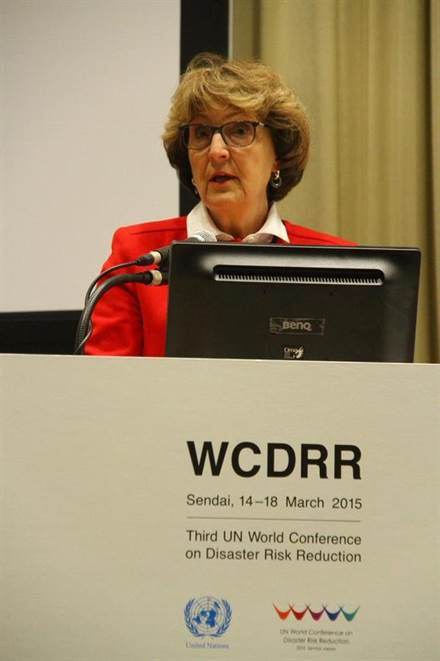
Recipe for Resilience – Ecosystem and climate Smart Disaster Risk Reduction
-
Climate and disaster risks
-
Coastal resilience
-
Community resilience
-
Integrated delta management
What are some of the “ingredients” that would make a “recipe for resilience”? Wetlands International and its programme partners in the coalition Partners for Resilience (CARE, Cordaid, Netherlands Red Cross and Red Cross/Red Crescent Climate Centre) explored this very question during a side event entitled “Sharing experiences for an integrated DRR approach”, at the Sendai World Conference on Disaster Risk Reduction (WCDRR) last Sunday.

The event was boosted by the distinguished presence of Her Royal Highness Princess Margriet of the Netherlands, as well as the Minister of Foreign Trade and Development Cooperation, Mrs. Lilianne Ploumen. Needless to say, many of us were a bit star-struck, being in the presence of royalty! But I think everyone was pleasantly surprised that Princess Margriet was very knowledgeable on disaster risk reduction and development issues. As well as very open to partake with participants and learn about their experiences.
Practitioners from Latin America, Africa and elaborated on their field experiences – the contributions to the resilience recipe to mitigate disaster risk and enhance livelihoods, particularly by addressing climate change and ecosystem management and restoration, in nine countries worldwide.
Our colleague from Wetlands International South Asia office, Dr. Ritesh Kumar urged participants to look at the wider context of the landscape and ecosystems, while not losing sight of the underlying risk factors at local level. On that same issue, Mr. Munish Kaushik from Cordaid reminded us that the community is the first responder. Thus it is vital to engage and empower our “local chefs” to be able to prepare a hearty resilience dish. But what tools can the local chefs use to carry out their work? Mr. Alejandro Maldonado, Secretary of the Disaster Risk Commission of Guatemala (SE-CONRED) made a compelling case for having an adequate institutional framework as one of these tools. The country´s Strategic Intersectoral Agenda (AEI, in Spanish) developed with the support of the Partners for Resilience is proof that such instruments can be developed to foster collaboration between actors and at different levels.
Another very poignant analogy to food-preparation was given by Mr. Mohammed Dida from Kenya. His experience has led him to consider early warning information as the spice which gives flavor to resilience. Timely, accessible and participatory systems are crucial for effective DRR. Finally, we must not forget about protecting our ingredient source – the community livelihoods. As the experience of Mr. Sileshi Zewdie from Ethiopia has shown, only through strengthened, diversified and adapted livelihoods can we ensure that sustained, resilient resources are available for the community to bounce back when disaster strikes.
So in conclusion, we can be encouraged by the different examples of practitioners around the world as real, concrete practical experiences. These can help us adapt and develop our “own local recipes” for resilience and a truly integrated approach to disaster risk reduction.
The Partners for Resilience (PfR) is an alliance of the Netherlands Red Cross (lead agency), CARE Netherlands, Cordaid, the Red Cross/Red Crescent Climate Centre, and Wetlands International. The PfR aim to reduce the impact of natural hazards on the livelihoods of around 400,000 vulnerable people worldwide. The name originates in the fundamental belief of its five members in the central role of resilience as the way to deal effectively with disasters. This means they use an integrated approach to mitigate disaster risk and enhance livelihoods, particularly by addressing climate change and ecosystem management and restoration. The PfR work together with local implementing partners in nine countries: Ethiopia, Guatemala, India, Indonesia, Kenya, Mali, Nicaragua, the Philippines and Uganda. The Partners for Resilience programme is financially supported by the Dutch Ministry of Foreign Affairs under its co-financing scheme (MFS II). More information: www.partnersforresilience.nl
